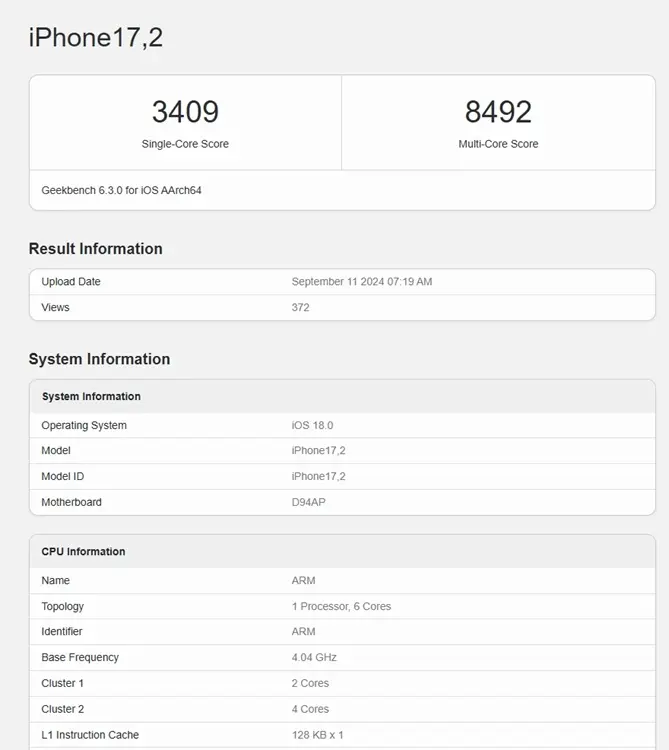
Apple has unveiled the iPhone 16 Pro and 16 Pro Max, both featuring the new A18 Pro chipset, which promises enhanced CPU performance. Built on the Armv9.2a architecture, the A18 Pro includes two SME units, or ML accelerators, for accelerated AI tasks. The Geekbench results confirm the A18 Pro’s impressive capabilities.
In Geekbench 6.3.0, which recently introduced SME support, the A18 Pro achieves notable scores of 3,409 points in single-core and 8,492 points in multi-core tests. This marks a 15.5% improvement in single-core performance and a 16.6% increase in multi-core performance compared to last year’s A17 Pro, which scored 2,950 and 7,279 respectively.

Compared to the A16 Bionic, the A18 Pro shows substantial gains, being 28.8% faster in single-core performance and 23.7% faster in multi-core performance. Notably, the A18 Pro’s performance core reaches a frequency of 4.04GHz, marking it as the first mobile chipset to exceed the 4GHz barrier in a passively cooled device, aside from the Apple M4-powered iPad Pro, which operates at 4.4GHz.
In contrast, recent Geekbench scores for the Snapdragon 8 Gen 4 have emerged from Digital Chat Station on Weibo, a well-known and trusted tipster. The upcoming OnePlus 13, featuring the Snapdragon 8 Gen 4 (which uses Armv8 architecture without SME units), is reported to achieve 3,236 points in single-core and an impressive 10,049 points in multi-core tests. These figures represent groundbreaking performance for a mobile SoC.

According to the leak, the Snapdragon 8 Gen 4 is just 5% behind the A18 Pro in single-core performance but offers 18% better multi-core performance. The Snapdragon 8 Gen 4 features eight Oryon CPU cores, compared to the six cores in the A18 Pro.
Additionally, Qualcomm has also achieved a notable milestone by pushing two of its Oryon cores to 4.32GHz, exceeding Apple’s 4.04GHz, while the remaining six cores run at 3.53GHz.
While further validation is needed, it seems Qualcomm has made substantial strides in the CPU department with the Snapdragon 8 Gen 4. The introduction of Nuvia-designed Oryon cores has delivered impressive gains for Qualcomm and the broader Android ecosystem. The competition to create the fastest mobile SoC is intensifying, and it’s certainly an exciting development to watch.




